人教版高中英语选修7 Unit 5 Travelling abroad Grammar复习非限制性定语从句课件(共25张PPT)
文档属性
| 名称 | 人教版高中英语选修7 Unit 5 Travelling abroad Grammar复习非限制性定语从句课件(共25张PPT) | 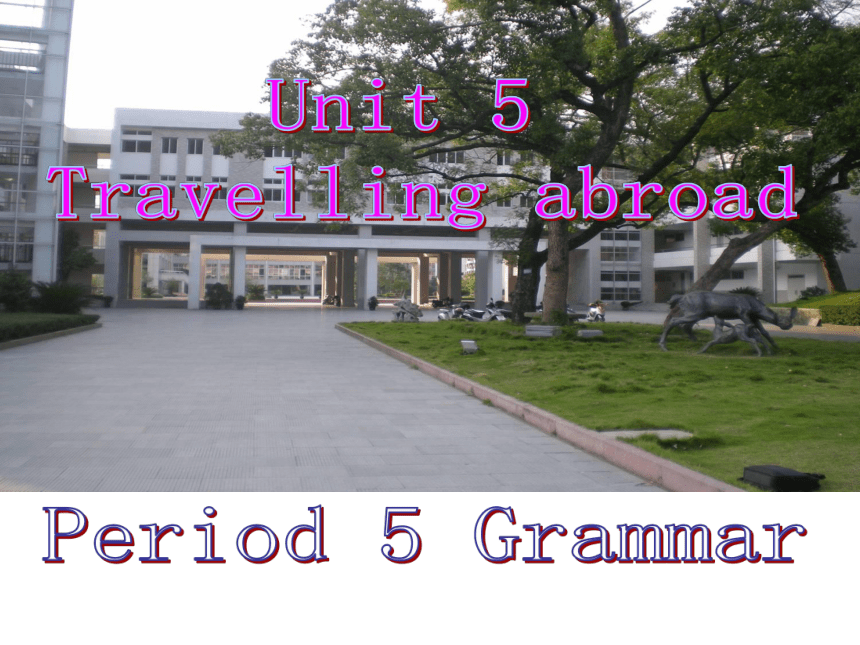 | |
| 格式 | zip | ||
| 文件大小 | 327.3KB | ||
| 资源类型 | 教案 | ||
| 版本资源 | 人教版(新课程标准) | ||
| 科目 | 英语 | ||
| 更新时间 | 2019-04-09 17:57:28 | ||
图片预览

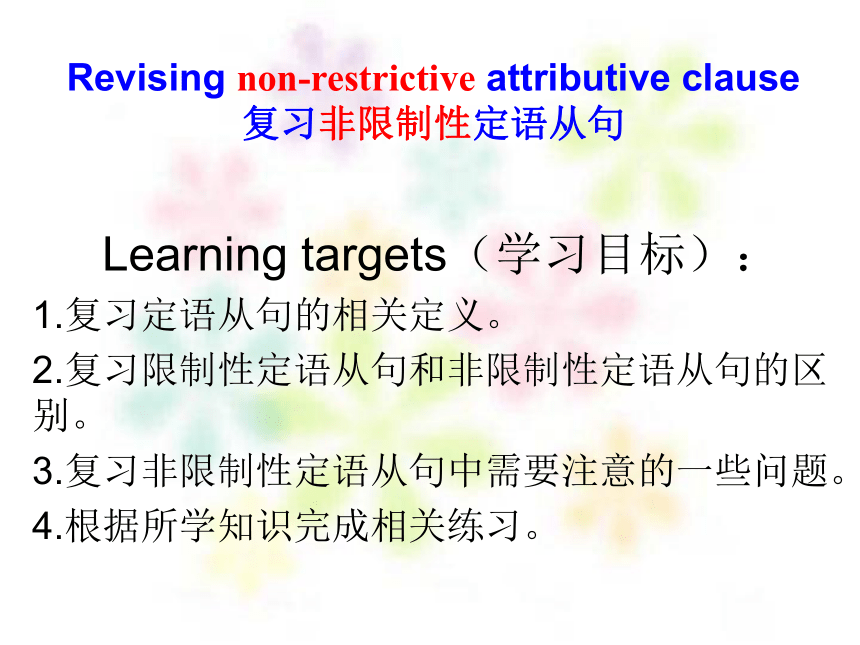
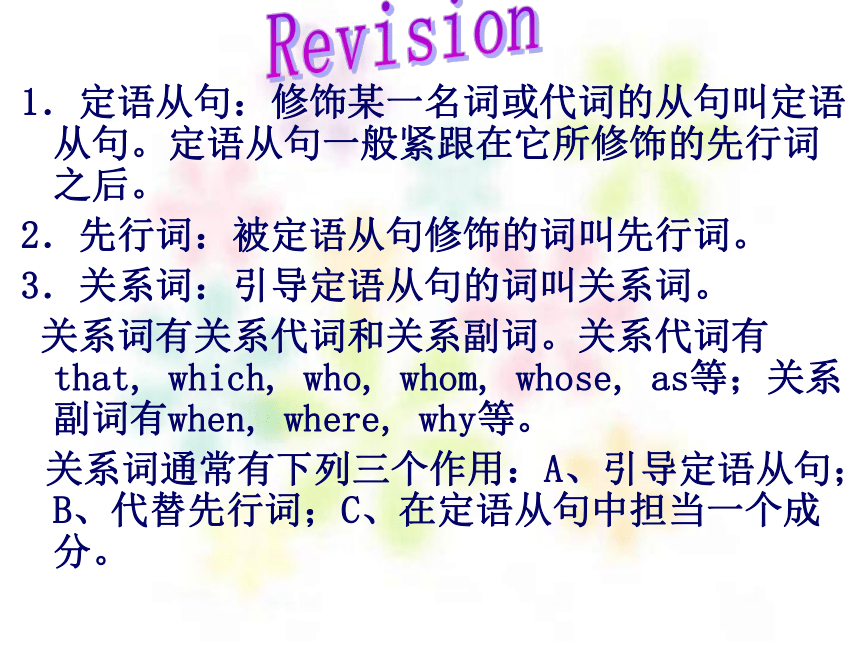
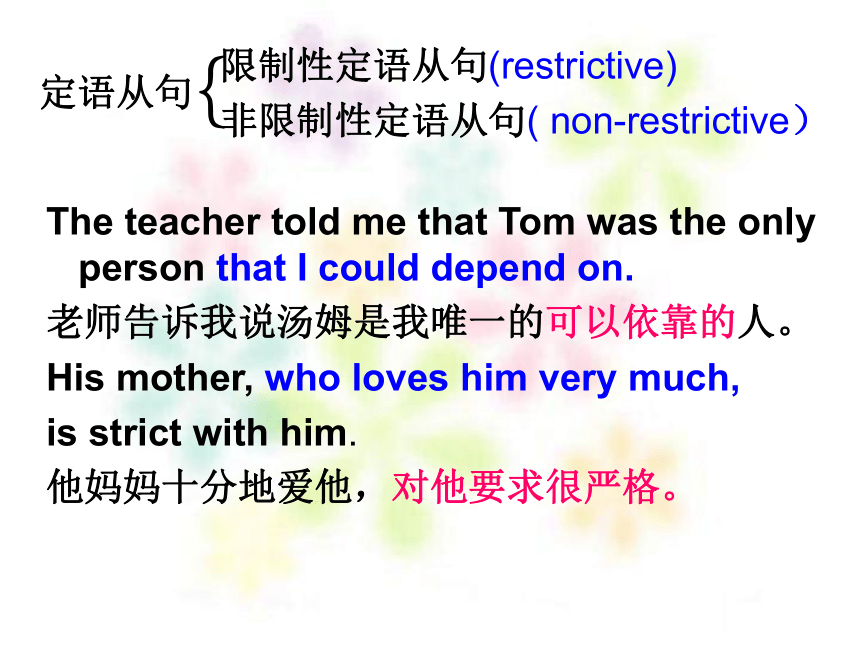
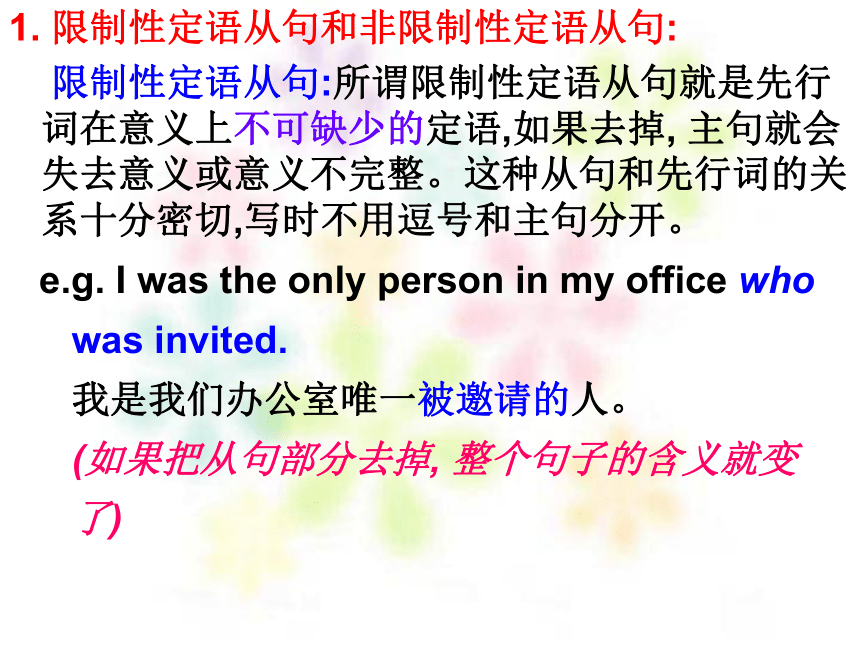
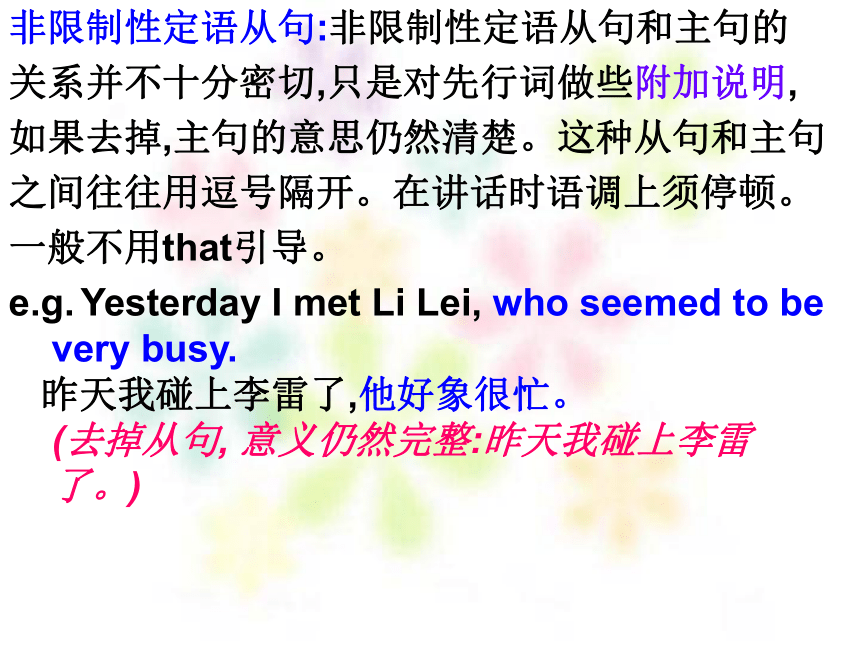
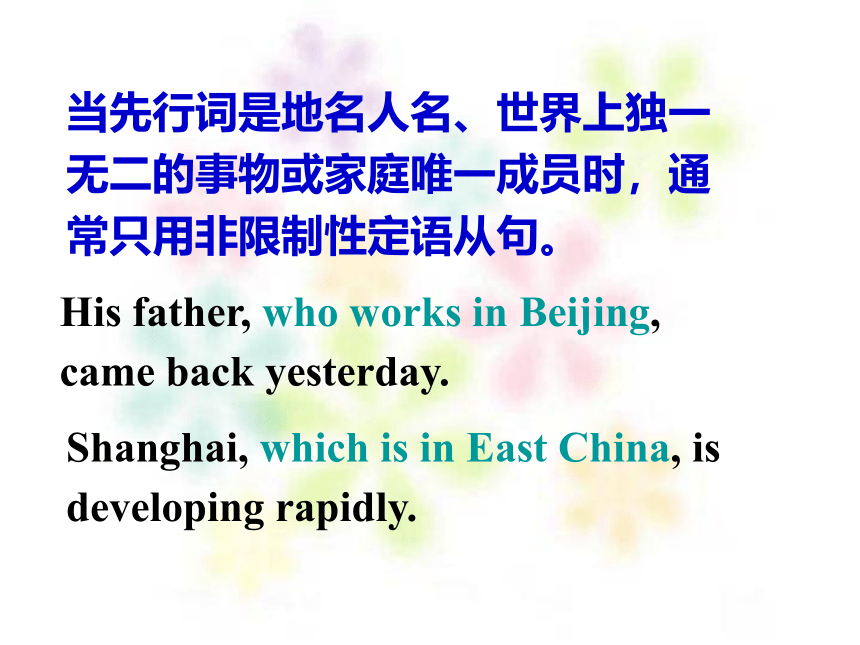
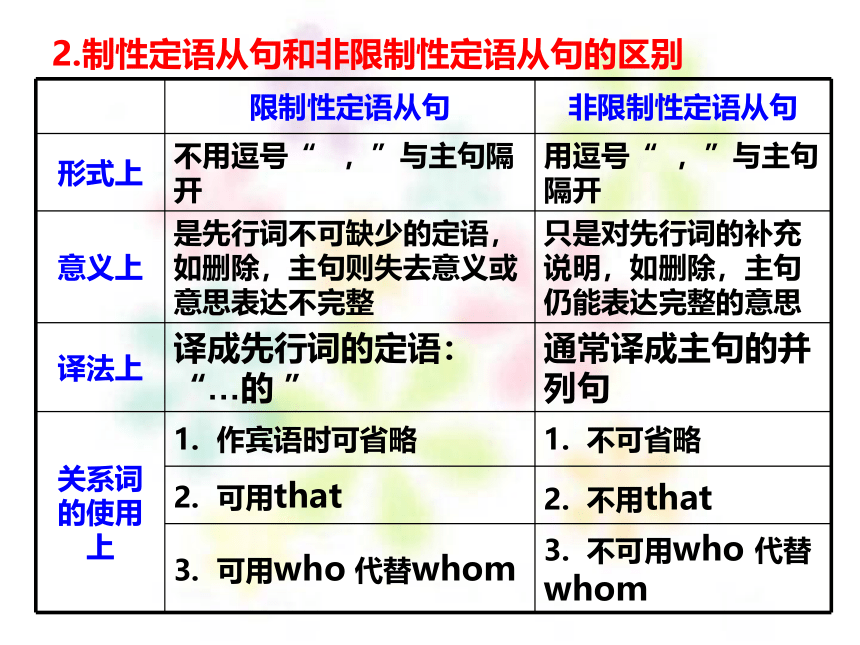
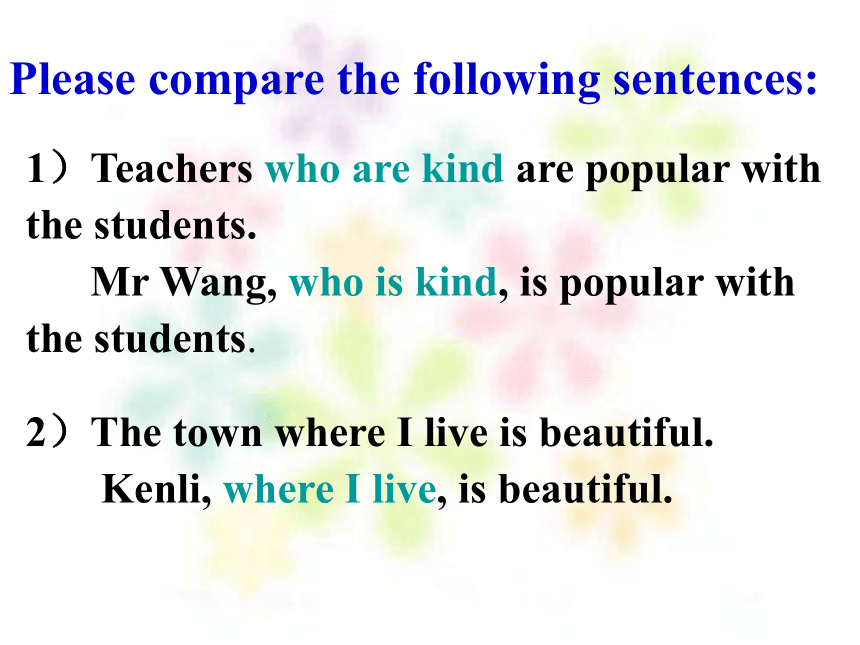
文档简介
课件25张PPT。Period 5 GrammarUnit 5
Travelling abroadRevising non-restrictive attributive clause 复习非限制性定语从句Learning targets(学习目标):
1.复习定语从句的相关定义。
2.复习限制性定语从句和非限制性定语从句的区 别。
3.复习非限制性定语从句中需要注意的一些问题。
4.根据所学知识完成相关练习。1.定语从句:修饰某一名词或代词的从句叫定语从句。定语从句一般紧跟在它所修饰的先行词之后。
2.先行词:被定语从句修饰的词叫先行词。
3.关系词:引导定语从句的词叫关系词。
关系词有关系代词和关系副词。关系代词有that, which, who, whom, whose, as等;关系副词有when, where, why等。??????
关系词通常有下列三个作用:A、引导定语从句;B、代替先行词;C、在定语从句中担当一个成分。 Revision 限制性定语从句(restrictive)
非限制性定语从句( non-restrictive)
The teacher told me that Tom was the only person that I could depend on.?
老师告诉我说汤姆是我唯一的可以依靠的人。
His mother, who loves him very much,
is strict with him.?
他妈妈十分地爱他,对他要求很严格。 {定语从句1. 限制性定语从句和非限制性定语从句:
限制性定语从句:所谓限制性定语从句就是先行词在意义上不可缺少的定语,如果去掉, 主句就会失去意义或意义不完整。这种从句和先行词的关系十分密切,写时不用逗号和主句分开。e.g. I was the only person in my office who was invited. 我是我们办公室唯一被邀请的人。 (如果把从句部分去掉, 整个句子的含义就变了)
非限制性定语从句:非限制性定语从句和主句的
关系并不十分密切,只是对先行词做些附加说明,
如果去掉,主句的意思仍然清楚。这种从句和主句
之间往往用逗号隔开。在讲话时语调上须停顿。
一般不用that引导。e.g. Yesterday I met Li Lei, who seemed to be very busy.
昨天我碰上李雷了,他好象很忙。 (去掉从句, 意义仍然完整:昨天我碰上李雷了。)His father, who works in Beijing, came back yesterday.当先行词是地名人名、世界上独一无二的事物或家庭唯一成员时,通常只用非限制性定语从句。Shanghai, which is in East China, is developing rapidly.2.制性定语从句和非限制性定语从句的区别2)The town where I live is beautiful.
Kenli, where I live, is beautiful.1)Teachers who are kind are popular with
the students.
Mr Wang, who is kind, is popular with
the students.Please compare the following sentences:1)Teachers who are kind are popular with the students.
Mr Wang, who is kind, is popular with the students.分析两种定语从句省略后的结果2)The town where I live is beautiful.
Kenli, where I live, is beautiful.限制性定语从句省略后主语所指就不明确,所以不能省略。3. 非限制性定语从句中需要注意的一些问题:
a. 在非限制性定语从句中, 指物时, 用which而不用that。
1. I like the book, which was bought
yesterday.
我喜欢这本书,这是昨天买的。
2. I like the book which / that was bought
yesterday.
我喜欢昨天买的那本书。b.在非限制性定语从句中,指人的关系代词作宾语时,只能用宾格whom; 不能用who替换,也不能省略。物主格用whose(也可指物)。
Do you know Tom, whom we talked about? 你认识汤姆吗? 我们谈到过他。
This book, which you can get at any bookshop, will give you all the information you need.这本书会给你提供所有你需要的资料,它在任何一家书店都能买到。
(非限制性定语从句中引导词在从句中作宾语,无论指人还是指物都不能省略。)
3) Li Ming, whose mother has been ill for two days, is absent from school today.李明今天没来上学,他的妈妈已经病了两天了。
c. 另外关系副词when(指时间), where (指地点)也可以引导非限制性定语从句。(注意关系副词why不能引导非限制性定语从句,要用for which代替why)。1) He lives in the city, where there is a high tower.
2) The People’s Republic of China was founded in 1949, when he was born.
3) I had told them the reason, for which I
didn’t attend the meeting.
4) I had told them the reason why I didn't
attend the meeting. d. “介词+关系代词”也可以引导非限定性定语从句。
1) Wu Dong, with whom I went to see the film, enjoyed it very much.
2) Her bag, in which she put all her books, has not been found.
3) The story about the Long March(长征), of which this is an example, are well written.
e .as, which 引导的非限定性定语从句
1)as和which都可引导非限定性定语从句,指代主句或主句的一部分,有时可以互换。但当从句的谓语动词是否定形式或类此是一个复合宾语结构时,一般用which而不用that。
2)as 位置比较灵活,能置于主句之后,句首或句末;且有“正如……的”之意。而which只能置于主句之后。
3)as常用于as is well-known,as we know,as we can see,as we expect,as often happens,as may be imagined等结构中。For examples:1.This kind of computer,as is well-known, is out of date.
2.As we know, smoking is harmful to one’s health.
3.Yesterday Mr. Green quarreled with his wife, as seldom happened.
4.He made the same mistake, which made the teacher very angry. Test how well you master it?James passed the driving test, _______ surprised everybody in the office.
A. it B. which C. this D. that
2. _______ is known to the world, Mark Twin was a great American writer. A. It B. which C. what D. As
3. She showed her teacher a reason, _______ she was late for school the day before yesterday. A. why B. which C. for which D. that 4. In the past we lost many chances, _______ we paid little attention. A. which B. that C. in which D. to which
5. Chaplin lived the last year of his life in Switzerland, _______he was buried in 1977 . A. where B. which C. why D. on which
6. Mary has two brothers, ________ are doctors. A. both of they B. both of whom
C. both of them D. whom of both
7. John said he’d been working in the office for an hour, which _______ true. A. were B. are to be C. was D. be 8. My aunt bought me a book, the name _______ I have forgotten. A. of it B. which C. whose D. of which
9. On the way home I met my friend John, from _______ home the thief had stolen a computer. A. whom B. which C. that D. whose
10. Lu xun, _______ everyone suspected, was a great writer in China. A. whose B. who C. which D. whom
Fill in the blanks with proper relative words.
1. The famous basketball star, ____ is an American, came to China yesterday.
2. In those days, she used to go to Mr Black, with ______ she had a wonderful time.
3. I bought a car yesterday, ______ cost
me a lot.whowhomwhich4. Xi’an, ______ I visited last year, is a nice old city.
5. He will come to see me next July, _______ he won’t be so busy.
6. The school, _______ I once studied, was built thirty years ago.
7. Many children, ______ parents are away working in big cities, are taken good care of in the village.whenwherewhosewhichConclusion定语从句的相关定义(定语从句,先行词和关系词)。
限制性定语从句和非限制性定语从句的概念和区别(形式上,意义上,译法上和关系词的使用上)。
非限制性定语从句中需要注意的一些问题。Homework1. Finish Ex2 and Ex3 on Page 41.
2. Remember the usage of non-restrictive attributive clause .
3. Preview the Using language on Page 43。Thank you !
Travelling abroadRevising non-restrictive attributive clause 复习非限制性定语从句Learning targets(学习目标):
1.复习定语从句的相关定义。
2.复习限制性定语从句和非限制性定语从句的区 别。
3.复习非限制性定语从句中需要注意的一些问题。
4.根据所学知识完成相关练习。1.定语从句:修饰某一名词或代词的从句叫定语从句。定语从句一般紧跟在它所修饰的先行词之后。
2.先行词:被定语从句修饰的词叫先行词。
3.关系词:引导定语从句的词叫关系词。
关系词有关系代词和关系副词。关系代词有that, which, who, whom, whose, as等;关系副词有when, where, why等。??????
关系词通常有下列三个作用:A、引导定语从句;B、代替先行词;C、在定语从句中担当一个成分。 Revision 限制性定语从句(restrictive)
非限制性定语从句( non-restrictive)
The teacher told me that Tom was the only person that I could depend on.?
老师告诉我说汤姆是我唯一的可以依靠的人。
His mother, who loves him very much,
is strict with him.?
他妈妈十分地爱他,对他要求很严格。 {定语从句1. 限制性定语从句和非限制性定语从句:
限制性定语从句:所谓限制性定语从句就是先行词在意义上不可缺少的定语,如果去掉, 主句就会失去意义或意义不完整。这种从句和先行词的关系十分密切,写时不用逗号和主句分开。e.g. I was the only person in my office who was invited. 我是我们办公室唯一被邀请的人。 (如果把从句部分去掉, 整个句子的含义就变了)
非限制性定语从句:非限制性定语从句和主句的
关系并不十分密切,只是对先行词做些附加说明,
如果去掉,主句的意思仍然清楚。这种从句和主句
之间往往用逗号隔开。在讲话时语调上须停顿。
一般不用that引导。e.g. Yesterday I met Li Lei, who seemed to be very busy.
昨天我碰上李雷了,他好象很忙。 (去掉从句, 意义仍然完整:昨天我碰上李雷了。)His father, who works in Beijing, came back yesterday.当先行词是地名人名、世界上独一无二的事物或家庭唯一成员时,通常只用非限制性定语从句。Shanghai, which is in East China, is developing rapidly.2.制性定语从句和非限制性定语从句的区别2)The town where I live is beautiful.
Kenli, where I live, is beautiful.1)Teachers who are kind are popular with
the students.
Mr Wang, who is kind, is popular with
the students.Please compare the following sentences:1)Teachers who are kind are popular with the students.
Mr Wang, who is kind, is popular with the students.分析两种定语从句省略后的结果2)The town where I live is beautiful.
Kenli, where I live, is beautiful.限制性定语从句省略后主语所指就不明确,所以不能省略。3. 非限制性定语从句中需要注意的一些问题:
a. 在非限制性定语从句中, 指物时, 用which而不用that。
1. I like the book, which was bought
yesterday.
我喜欢这本书,这是昨天买的。
2. I like the book which / that was bought
yesterday.
我喜欢昨天买的那本书。b.在非限制性定语从句中,指人的关系代词作宾语时,只能用宾格whom; 不能用who替换,也不能省略。物主格用whose(也可指物)。
Do you know Tom, whom we talked about? 你认识汤姆吗? 我们谈到过他。
This book, which you can get at any bookshop, will give you all the information you need.这本书会给你提供所有你需要的资料,它在任何一家书店都能买到。
(非限制性定语从句中引导词在从句中作宾语,无论指人还是指物都不能省略。)
3) Li Ming, whose mother has been ill for two days, is absent from school today.李明今天没来上学,他的妈妈已经病了两天了。
c. 另外关系副词when(指时间), where (指地点)也可以引导非限制性定语从句。(注意关系副词why不能引导非限制性定语从句,要用for which代替why)。1) He lives in the city, where there is a high tower.
2) The People’s Republic of China was founded in 1949, when he was born.
3) I had told them the reason, for which I
didn’t attend the meeting.
4) I had told them the reason why I didn't
attend the meeting. d. “介词+关系代词”也可以引导非限定性定语从句。
1) Wu Dong, with whom I went to see the film, enjoyed it very much.
2) Her bag, in which she put all her books, has not been found.
3) The story about the Long March(长征), of which this is an example, are well written.
e .as, which 引导的非限定性定语从句
1)as和which都可引导非限定性定语从句,指代主句或主句的一部分,有时可以互换。但当从句的谓语动词是否定形式或类此是一个复合宾语结构时,一般用which而不用that。
2)as 位置比较灵活,能置于主句之后,句首或句末;且有“正如……的”之意。而which只能置于主句之后。
3)as常用于as is well-known,as we know,as we can see,as we expect,as often happens,as may be imagined等结构中。For examples:1.This kind of computer,as is well-known, is out of date.
2.As we know, smoking is harmful to one’s health.
3.Yesterday Mr. Green quarreled with his wife, as seldom happened.
4.He made the same mistake, which made the teacher very angry. Test how well you master it?James passed the driving test, _______ surprised everybody in the office.
A. it B. which C. this D. that
2. _______ is known to the world, Mark Twin was a great American writer. A. It B. which C. what D. As
3. She showed her teacher a reason, _______ she was late for school the day before yesterday. A. why B. which C. for which D. that 4. In the past we lost many chances, _______ we paid little attention. A. which B. that C. in which D. to which
5. Chaplin lived the last year of his life in Switzerland, _______he was buried in 1977 . A. where B. which C. why D. on which
6. Mary has two brothers, ________ are doctors. A. both of they B. both of whom
C. both of them D. whom of both
7. John said he’d been working in the office for an hour, which _______ true. A. were B. are to be C. was D. be 8. My aunt bought me a book, the name _______ I have forgotten. A. of it B. which C. whose D. of which
9. On the way home I met my friend John, from _______ home the thief had stolen a computer. A. whom B. which C. that D. whose
10. Lu xun, _______ everyone suspected, was a great writer in China. A. whose B. who C. which D. whom
Fill in the blanks with proper relative words.
1. The famous basketball star, ____ is an American, came to China yesterday.
2. In those days, she used to go to Mr Black, with ______ she had a wonderful time.
3. I bought a car yesterday, ______ cost
me a lot.whowhomwhich4. Xi’an, ______ I visited last year, is a nice old city.
5. He will come to see me next July, _______ he won’t be so busy.
6. The school, _______ I once studied, was built thirty years ago.
7. Many children, ______ parents are away working in big cities, are taken good care of in the village.whenwherewhosewhichConclusion定语从句的相关定义(定语从句,先行词和关系词)。
限制性定语从句和非限制性定语从句的概念和区别(形式上,意义上,译法上和关系词的使用上)。
非限制性定语从句中需要注意的一些问题。Homework1. Finish Ex2 and Ex3 on Page 41.
2. Remember the usage of non-restrictive attributive clause .
3. Preview the Using language on Page 43。Thank you !
